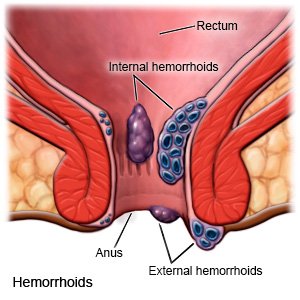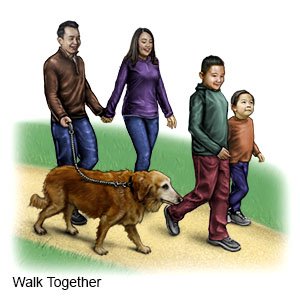Hemorrhoids
Medically reviewed by Drugs.com. Last updated on Aug 4, 2025.
Hemorrhoids are swollen blood vessels inside your rectum (internal hemorrhoids) or on your anus (external hemorrhoids). Sometimes a hemorrhoid may prolapse. This means it extends out of your anus.
 |
DISCHARGE INSTRUCTIONS:
Return to the emergency department if:
- You have severe pain in your rectum or around your anus.
- You have severe pain in your abdomen, and you are vomiting.
- You have bleeding from your anus that soaks through your underwear.
Call your doctor if:
- You have frequent and painful bowel movements.
- Your hemorrhoid looks or feels more swollen than usual.
- You do not have a bowel movement for 2 days or more.
- You see or feel tissue coming through your anus.
- You have blood in your bowel movements.
- You have questions or concerns about your condition or care.
Related medications
Treatment options
The following list of medications are related to or used in the treatment of this condition.
Medicines:
You may need any of the following:
- Medicines can help decrease pain and swelling, and soften your bowel movement. The medicine may be a pill, pad, cream, or ointment.
- Take your medicine as directed. Contact your healthcare provider if you think your medicine is not helping or if you have side effects. Tell your provider if you are allergic to any medicine. Keep a list of the medicines, vitamins, and herbs you take. Include the amounts, and when and why you take them. Bring the list or the pill bottles to follow-up visits. Carry your medicine list with you in case of an emergency.
Manage your symptoms or prevent hemorrhoids:
- Eat a variety of high-fiber foods. Examples include fruits, vegetables, and whole grains. Fiber is an important part of hemorrhoid treatment. High-fiber foods soften your bowel movements and increase the bulk. This helps you avoid straining. Ask your provider how much fiber you need each day. In general, 25 to 35 grams of fiber a day may be recommended. Over-the-counter fiber supplements may also help.

- Do not strain to have a bowel movement. Straining can increase pressure on the tissues in your rectum and anus. When you sit on the toilet, do it for short periods of time if you are able, such as 3 to 5 minutes.
- Take a sitz bath. Fill a bathtub with 4 to 6 inches of warm water. You may also use a sitz bath pan that fits inside a toilet bowl. Sit in the sitz bath for 15 minutes, 3 to 5 times a day. The warm water can help decrease pain and swelling.
- Keep your anal area clean. Gently wash the area with warm water daily. Soap may irritate the area. After a bowel movement, gently wipe with moist towelettes or wet toilet paper. Dry toilet paper can irritate the area. Bidet toilet seats that spray water can be connected to your toilet. Portable spray bottle bidets can be used to clean your anal area. They can also be attached to a water bottle.
- Drink plenty of liquids. Liquids can help prevent constipation and keep your bowel movements soft. Ask how much liquid to drink each day and which liquids are best for you. In general, 2 liters of water a day may be recommended. Avoid caffeine and alcohol.
- Exercise as directed. Exercise, such as walking, may help prevent constipation and make it easier to have a bowel movement. Work with your provider to create an exercise plan.

- Avoid heavy lifting. This can cause you to strain and increase your risk for another hemorrhoid.
Follow up with your doctor as directed:
Write down your questions so you remember to ask them during your visits.
© Copyright Merative 2025 Information is for End User's use only and may not be sold, redistributed or otherwise used for commercial purposes.
The above information is an educational aid only. It is not intended as medical advice for individual conditions or treatments. Talk to your doctor, nurse or pharmacist before following any medical regimen to see if it is safe and effective for you.
Learn more about Hemorrhoids
Treatment options
Care guides
Symptoms and treatments
Further information
Always consult your healthcare provider to ensure the information displayed on this page applies to your personal circumstances.
